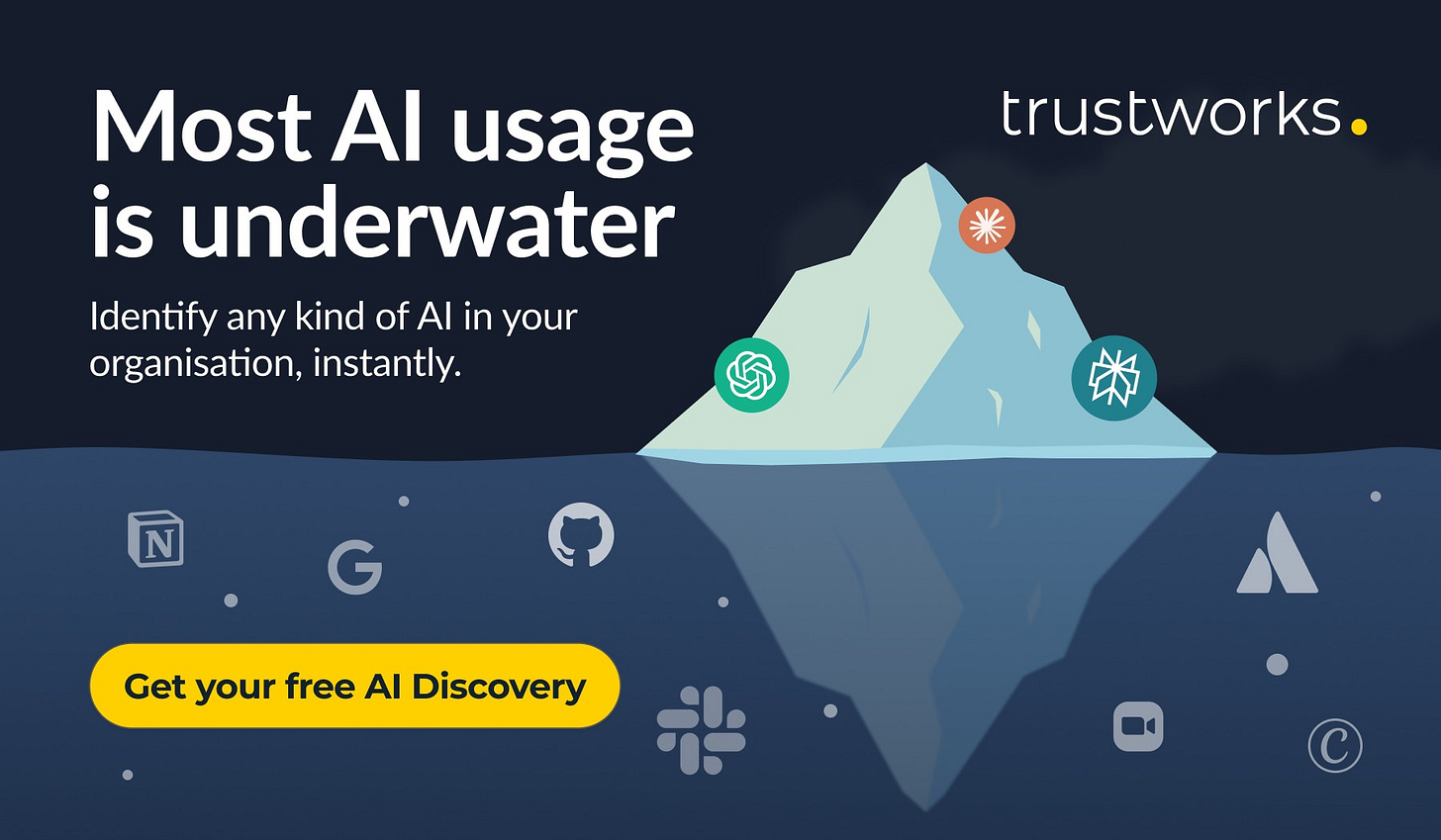The AI-Powered Mediocrity Line
The demand for excellent professionals is rising, and it will likely be among the major factors of change in the job market and in how people plan their lives in the upcoming years | Edition #231
👋 Hi everyone, Luiza Jarovsky here. Welcome to our 231st edition, now reaching over 76,700 subscribers in 170 countries. For more resources:
AI Governance Training: Apply for a discounted seat here
Learning Center: Receive additional AI governance resources
Job Board: Find open roles in AI governance and privacy
AI Book Club: Discover your next read in AI and beyond
👉 A special thanks to TrustWorks, this edition's sponsor:
The biggest compliance risk is the AI you can’t see. With the EU AI Act in force, there’s no time to waste. TrustWorks detects all AI usage, builds an accurate AI Systems Registry, and classifies risk automatically. Stay ahead – claim your free AI Discovery today.
The AI-Powered Mediocrity Line
When writing about AI's legal and ethical challenges, I often think about the future of work and how people will be able to find meaning and happiness, both individually and collectively, in the face of growing automation.
The more I observe the latest developments and pay attention to data on AI deployment, the more confident I am that the demand for excellent professionals is rising, and that this will likely be among the major factors of change in the job market and in how people plan their lives in the upcoming years.
As AI is ubiquitously deployed, professionals who can remain above the AI-powered mediocrity line will be highly appreciated and well compensated.
It also means that professionals who, for various reasons, cannot remain above the AI-powered mediocrity line will face growing job insecurity, and existing social disparities will be amplified.
-
An important reason behind the increased demand for excellent professionals is that AI-powered outputs alone are suboptimal. And it has nothing to do with AI capabilities or with the state of AI development.
If you think about generative AI systems, for example, all existing systems have a certain “hallucination” rate, meaning that a percentage of all outputs will be false, made up.
It is unclear if AI misinformation will ever disappear, which means that optimal work cannot be done by AI only; an expert still needs to oversee, review, and correct it.
And it cannot be any professional; good human oversight will involve someone extremely knowledgeable who can spot mistakes even if they are presented with confidence and supported by “evidence.”
AI misinformation is not the only problem.
AI liability is a gray area in most parts of the world, meaning that it is not clear what happens or who will be held accountable if AI-powered decisions or outputs cause harm.
If a company places AI in the hands of inexperienced professionals or implements AI without proper safeguards and oversight, it will likely have to bear higher legal costs, including liability costs, when AI produces inaccurate, unethical, risky, or unsuitable results.
It is not a coincidence that some “AI-first” companies have been rolling back AI functionalities. Many are realizing that “full automation” disconnected from excellent human work fails to meet legal, ethical, and quality standards, and these miscalculations might end up being expensive.
-
It's also becoming clear that some types of work are deeply connected to the expertise, authenticity, and qualities of the human delivering it.
Let us take lawyers, for example. Legal work involves not only researching and writing legal briefs, but also discussing with clients, persuading judges, giving strong oral presentations, and so on. AI will be, at most, a tool; it will never replace excellent lawyers.
In architecture or design, for example, AI can be a tool to help the work process, but I am convinced that clients are paying for the curation, taste, style, and touch of the human professional they choose.
The same is true for art: the value of creative work is often connected to its author's journey and story. How the work was developed, where the inspiration came from, other projects the author is involved in, and so on.
AI can serve as a tool to amplify excellence, but it is not and will not be a replacement for it.
-
On the flip side of the rise of excellent work is the fall of mediocre work.
Today, anyone with access to the internet is able to use powerful AI systems to create something mediocre in seconds: an AI-generated book, an AI-generated song, an AI-generated report, and so on.
For people who have not invested in education, upskilling, AI literacy, and accompanying human skills (leadership, empathy, critical thinking, etc.), or who simply are not interested in the job they are doing and deliver mediocre work, life will be harder.
Why?
Because now, with the help of AI, anyone, even people with zero previous experience and zero education in the field, can deliver a similar (potentially better or faster) mediocre outcome.
People under this AI-powered mediocrity line will be facing much greater job insecurity because AI has created a massive layer of people who can do mediocre work faster or better with AI.
-
We should not be naïve. This rise of excellent professionals I am describing leads to two important challenges to be overcome: a social one and an educational one (and both are related).
The AI-powered mediocrity line will likely penalize junior professionals and people who do not have the necessary resources, connections, or opportunities to pursue training, upskilling, and apprenticeships. It will also amplify existing social inequalities, and those who are already left out of the job market will face even more job insecurity.
Additionally, to navigate a future of growing automation, people must be able to understand AI, know how to and when to deploy it professionally, and reject it when they consider it inadequate, insufficient, risky, unethical, or inappropriate.
The growing AI literacy divide will therefore be a major negative force, potentially leaving people out of the job market and more vulnerable to AI harms.
-
The fact that human excellence can thrive and grow in demand, even in the face of ubiquitous automation, is extremely optimistic and should inspire confidence and determination in everyone focusing on their professional journey and growth.
Policymakers and regulators should know that education, training, AI literacy, and professional excellence remain strong antidotes against unemployment and AI replacement in the job market.





Thank you! As a professional writer and creative director who became the victim of AI-mania, I have been shouting this to my fellow creatives. Thanks for the wonderful work you do.
I like the idea. Would be interesting to operationalize it (put numbers around it). For example, what percent of creatives and lawyers are below the mediocrity line? Probably not many (yet). How good are executives at understanding the mediocrity line (how often are they duped by the appearance of mediocre work because it helps the bottom line)? I would say more.